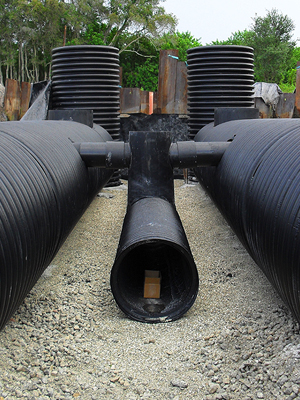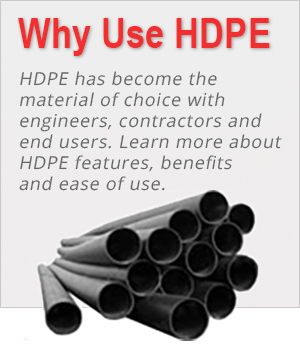

Seminole Heights Wastewater Overflow
This overflow project directed rainwater to a local lake and prevented stormwater overflow to neighborhoods.

HDPE pipe and fittings are quickly becoming the material of choice among engineers, contractors and customers for a wide variety of industry applications including municipal, industrial, energy, geothermal, marine, mining, landfill, HVAC, gas, oil, mining and agricultural applications.
HDPE pipe is strong, durable, flexible and light weight. When fused together, HDPE offers a zero leak rate due to the seamless nature of the pipe system. HDPE pipe offers a more environmentally sustainable footprint because it is non-toxic, corrosion and chemical resistant, has a long lifespan, and is suitable for trenchless installation methods.


Some Significant Advantages for Using HDPE Pipe and Fittings Include:
Handling – HDPE is much easier to handle and install compared to other pipe materials, allowing for significant cost advantages and ROI. Because HDPE is about one-eighth the density of steel, it does not require the use of heavy lifting equipment during installation. HDPE flexibility allows for bending without the need for additional fittings and can be installed over uneven terrain easily in continuous lengths.
Reduced installation costs – HDPE is especially well suited for trenchless applications due to its seamless capabilities and flexible characteristics which allow for a bending radius of 20 to 25 times outside diameter of pipe. HDPE is commonly used in directional boring, plowing, river crossings, pipe bursting and sliplining. HDPE pipe systems require fewer fittings and can be welded into seamless leak-free pipe runs, allowing for significant savings in labor and equipment.
Heat-fused joints – HDPE pipe can be heat fused together to form a joint that is as strong as or stronger than the pipe itself while being virtually leak free. Butt fusion and electrofusion are the most common and reliable welding techniques used to weld HDPE and offer significant installation advantages compared to traditional pipe materials.
Corrosion and Chemical Resistance – HDPE pipe will not rust, corrode, tuberculate or support biological scale or growth, and has superb chemical resistance compared to traditional pipe materials. HDPE performs exceptionally well in mining, dredging and similar applications, outwearing many more costly piping materials, and offers excellent corrosion resistance to corrosive acids, bases and salts. HDPE is unaffected by bacteria and fungi, offering resistance to many organic substances.
Superior Flow Characteristics – Because HDPE pipe is smoother than steel, cast iron, ductile iron, or concrete, a smaller diameter HDPE pipe can produce an equivalent volumetric flow rate at the same pressure.
It has less drag and a lower tendency for turbulence at high flow rates. HDPE’s superior chemical resistance and non-stick surface characteristics nearly eliminate scaling and pitting, preserving the excellent hydraulic characteristics throughout the pipe system’s service life.
Fast Learning Curve for Installers – Learning how to use HDPE in the design and installation of piping systems is easier than you think. Through the HDPE, Inc. training services, contractors and installers can train their team to use this highly-advantageous material in new and existing applications.



